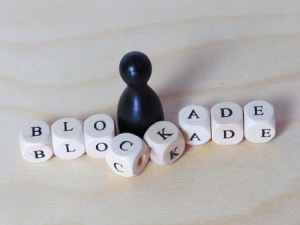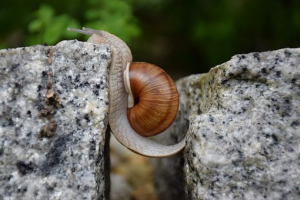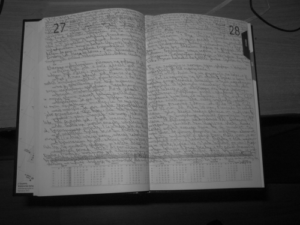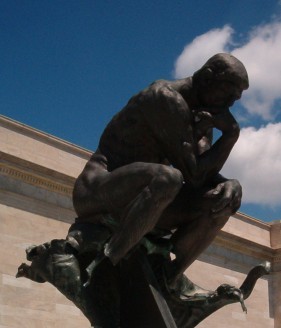The Single Most Overused Sentence in Self-Help Books
(And what you can do to really use this sentence to your advantage).
 Don’t get me wrong. Personal development books (by the way, I hate the term “self-help”) do work. In fact, I changed my life because such a book caused a shift in my perspective on success and life.
Don’t get me wrong. Personal development books (by the way, I hate the term “self-help”) do work. In fact, I changed my life because such a book caused a shift in my perspective on success and life.
However, they don’t work very often. And this one overused sentence is a reason for that:
“Ask Yourself a Question…”
I don’t suggest you shouldn’t ask yourself questions, because the book should provide all the solutions for you on a golden plate. Yep, you should do the work. If you want someone else to do the heavy lifting for you, pay hundreds of bucks for coaching or thousands of bucks for consultations, not a few bucks for the “self-help” book.
In fact, purchasing and reading a book suggests that you prefer to work out your problems alone. No shame in that; many small issues in life are totally manageable on your own.
So, where does the damage come from? Why is this sentence overused to the point of abuse?
Expert’s Blind Spot
I write personal development books. I know plenty of other authors in that genre. We are not a common flock.
 Most of us are self-made, and we are especially skillful in areas that most people really suck: mindset, self-analysis, motivation, willpower and managing our emotional states. Oh yes, at one point every personal development author was at the same starting position as his readers – confused at best, and a clueless mess at worst. But they painstakingly built themselves from the ground level (and some, like me, from the below-ground level) to the point where those skills are as natural to them as breathing.
Most of us are self-made, and we are especially skillful in areas that most people really suck: mindset, self-analysis, motivation, willpower and managing our emotional states. Oh yes, at one point every personal development author was at the same starting position as his readers – confused at best, and a clueless mess at worst. But they painstakingly built themselves from the ground level (and some, like me, from the below-ground level) to the point where those skills are as natural to them as breathing.
But asking self-analysis questions is not natural for the majority of the population.
Even if a reader takes a break to actually do the exercises prescribed by an author (which only a very few do), the results of such exercises will rarely convert into any lasting effect. Overwhelmed by life, a reader will simply forgot about his insightful answers. They will fade away with time.
Authors are sadly ignorant about this fact, and they pack their books with exercise after exercise and a question after question. Eventually, they assume that their readers are an above-average bunch, and they possess the art of governing one’s mind effectively.
That’s why, most of the time, the biggest benefit of reading “self-help” books is that you are not indulging yourself with much more harmful activities, like watching TV or taking drugs. They occupy your time, and something useful (research says we retain about 4% of what we read one time) always will stick in your mind.
What Can You Do to Make this “Magic Sentence” Work for You?
 Develop a habit of mindfulness. The exact method you’ll employ is of little importance. The crucial part is to make your mindfulness habitual. I call it “mindfulness” because it’s the most popular term, but what I mean is the state of mind that allows you to ask yourself questions. What is more, those are different questions than usual.
Develop a habit of mindfulness. The exact method you’ll employ is of little importance. The crucial part is to make your mindfulness habitual. I call it “mindfulness” because it’s the most popular term, but what I mean is the state of mind that allows you to ask yourself questions. What is more, those are different questions than usual.
Your subconscious bombards you with questions all the time. And most of those questions are crap: “Why does it always happen to me?” or “Why am I a failure?”
They aren’t tools for gathering information, but rather clubs used to beat you down.
Developing your new habit, you should follow the framework: design it consciously, do it every day, identify yourself with a habit (“I am a person who…”), track it, build a streak (do it every day and maintain a visual reminder of how long your streak is). If necessary, start very small, so doing your new habit every day should not be a problem. Consistency of your routine is more important than initial results.
Here comes several specific activities to build such mindfulness habits:
1. Journaling.
 This is, by far, my favorite method. 6 days a week, I ask myself an insightful question and answer it on paper. On the 7th day, I read and review my entries. I dedicate 10-15 minutes in my morning for this. I’ve been doing it since 26th of May, 2013. That’s a lot of repetitions and a lot of questions answered.
This is, by far, my favorite method. 6 days a week, I ask myself an insightful question and answer it on paper. On the 7th day, I read and review my entries. I dedicate 10-15 minutes in my morning for this. I’ve been doing it since 26th of May, 2013. That’s a lot of repetitions and a lot of questions answered.
Not only did I get over a thousand answers, I also developed a mindfulness habit. I don’t go lightly over new questions in my life. This practice hammered into me a deep work kind of approach to answering personal development questions. I don’t brush them aside. In fact, when I get an interesting question, I note it down in my journal and answer in one of my morning sessions.
2. Meditation.
 Meditation is very easy to start in small doses (2 minutes or less). You don’t need any accessories for it, and you can do it practically everywhere and in any moment.
Meditation is very easy to start in small doses (2 minutes or less). You don’t need any accessories for it, and you can do it practically everywhere and in any moment.
It gives you a picture of your mental world like no other activity. Apart from journaling, of course 



